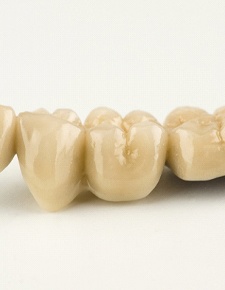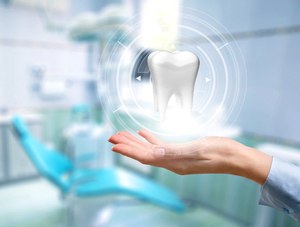Dental Bridges — Friendswood, TX
Preserve Your Smile by Replacing Missing Teeth

It’s not easy living with large gaps in your smile caused by missing teeth. With nothing to replace them, it can cause serious issues down the road, like tooth misalignment and an increased risk of oral health problems such as gum disease. Fortunately, Dr. James Sierra crafts customized dental bridges for Friendswood, TX dental patients, using the latest dental technology. These restorations are beautiful and natural-looking, allowing them to replace your missing teeth without making it obvious that you once had gaps in your smile. If you’d like to learn whether you can benefit from a dental bridge in Friendswood, contact our dental office today to schedule a consultation.
What is a Dental Bridge?

Dental bridges are customized restorations made to replace missing teeth so you can continue speaking and eating with ease. The restoration is made of replacement teeth connected between two dental crowns. The crowns anchor your replacement teeth between the two natural teeth on either side of the gap. This provides added security and stability, so you won’t have to worry about them shifting out of place.
Dr. Sierra also offers implant-supported bridges that are fixed to titanium posts surgically placed below your gums and fused with your jawbone. That way, they provide stimulation to the bone and prevent deterioration.
The Benefits of Getting a Dental Bridge

Many people can benefit from replacing their consecutive missing teeth with a dental bridge. Having gaps in your smile can impact you in a variety of water. After your replacement teeth are affixed to your mouth, you’ll be able to enjoy advantages such as:
- A restored smile and boosted confidence.
- An easier time chewing food.
- Restored ability to pronounce certain sounds.
- Maintain your facial structure and prevent saggy and droopiness.
- Re-distribute your bite force.
- Prevent your remaining teeth from becoming misaligned.
The Process of Getting a Dental Bridge

When you decide that a dental bridge is the best tooth-replacement option for you, we’ll begin by preparing the teeth on either side of the gap in your mouth to receive the dental crowns. This will involve removing a small amount of enamel to ensure that your bridge comfortably and securely incorporates with the rest of your teeth. After that, we’ll take impressions of the area and send them off to our dental laboratory to craft your customized restoration.
Dental Bridges FAQs

Dental bridges in Friendswood have been a go-to solution to replace missing teeth for generations, but it's normal to have some concerns before you're ready to move forward. Dr. James T. Sierra will explain everything during your consultation. In the meantime, you can contact our office to speak with a member of our team or take a look at the most frequently asked questions below.
How Many Teeth Can a Bridge Replace?
A dental bridge can treat 1 or more lost teeth in a row. Generally, fixed bridges are recommended to replace 1-3 teeth. Although it's possible to treat more teeth, longer restorations can be unstable and have a shorter life expectancy. As an alternative, your dentist may suggest a partial denture or implant-supported bridge to replace several teeth.
Does It Hurt to Get a Dental Bridge?
Your comfort is always our top priority. Your dentist in Friendswood may administer a local numbing agent while preparing your teeth for your restoration. You won't have any outright pain, but you may feel some pressure or unusual sensations. Although you won't have any pain when getting your bridge, your mouth can be tender for a couple of days after the effects of any numbing medications wear off. You can manage it with an over-the-counter pain reliever and eat soft foods until any tenderness subsides. Your dentist will review any additional aftercare instructions before you go home.
How Long Does a Dental Bridge Last?
A dental bridge can last for 5 to 15 years before needing to be replaced. Many factors affect the lifespan, like the materials, length of the restoration, and your aftercare routine. You can ensure your bridge lasts for a decade or longer with good oral hygiene. Brush your teeth at least twice a day and floss daily. Limit your consumption of sugar and starches, and avoid any hard or sticky foods. Keep inedible objects out of your mouth, including your fingernails. Visit your dentist every 6 months for a cleaning and checkup. We'll keep your teeth and gums healthy to ensure your bridge continues to function as intended.
Are Dental Implants Cheaper Than a Bridge?
A dental implant can cost more than a traditional bridge initially, but it's the most affordable overall. A dental implant replaces the entire structure, not just a portion above the gum line. As a result, this keeps your jawbone strong and healthy to avoid common issues caused by missing teeth. You'll lower your long-term dental expenses by preventing costly procedures later. Dental implants have over a 95% success rate and are proven to last for decades with the correct care. You'll never have to budget for replacements.
Does Dental Insurance Cover Bridges?
You can use your dental insurance to offset the cost of certain steps in your treatment plan, like your consultation, diagnostic imaging, and any prep work. Your dental insurance can cover some of the expenses for your bridge after meeting your annual deductible. You can use your yearly allowance to lower the amount you will pay. A member of our office will work on your behalf with your dental insurance to maximize your coverage to lower your out-of-pocket responsibility. They will also review your payment options for any remaining balance, like monthly installments.
